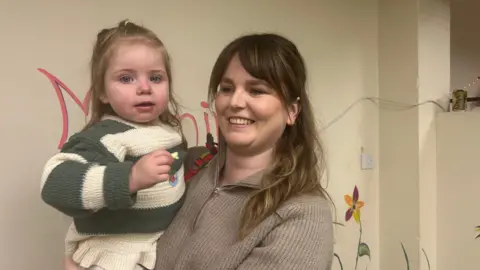Birth rates dropping due to 'financial pressures'
 BBC
BBCBirth rates in the South West have declined due to the current economic climate, an expert has said.
Dr Alexander Haupt, professor of economics at the University of Plymouth, said financial insecurity had caused a decline in the number of children born in Devon.
Devon mum Rachel May said it took her four and a half years of In vitro fertilization (IVF) to have her daughter. She said the cost of having a child and the difficulty of surviving on maternity pay made it difficult.
A government spokesperson said maternity pay was only "one element of support available for pregnant women and new mothers, who may also be eligible for universal credit or child benefit".

Ms May said maternity pay was an absolute pittance.
"I hear so many people saying they don't know how they are going to do it when they leave work to have a child," she said.
Emma Gould, who has two children aged two and six, said she could not afford for both of her children to attend nursery at the same time.
The Office for National Statistics said fertility rates in England and Wales had been in overall decline since 2010.
It reported between 2022 and 2023, the total fertility rate (TFR) for England and Wales decreased from an average of 1.49 children per woman over their lifetime to 1.44 - the lowest rate on record.

Laura Gilbert, owner of Moo Music, an early learning venue in Plymouth, said she had noticed numbers in the sessions for younger children had declined.
She said: "It's harder to reach parents who only have one child. If we have a parent who has already come through, they already know of us."
Professor Haupt said the university had observed a decline in fertility rates since the cost of living crisis.
"It has reached a pretty low level," said Prof Haupt.

"A big issue is economic insecurity which is why I think we have seen a decline in fertility rates since the financial crisis.
"Having children is a long-term decision and people would appreciate being able to do that in a relatively secure economic environment."
He said one key impact of the birth rate decline could be "labour shortages" in the future.
"If you are looking at the South West industries or sectors that identify as tourism or as agriculture, particularly as they are low-paid sectors, they find it difficult to find sufficient labour," he said.
He said the most important thing the government could do was to provide a "secure economic environment".
Parental leave review
"Regulations of the labour market, of maternity leave and sorting the housing market might be helpful," he added.
A government spokesperson said no one who wanted to have children should feel prohibited from doing so.
"As part of our wider work to ensure we offer the best possible support to working families and boost economic growth, we will be carrying out a review of wider statutory parental leave," they said.
They added details of the review of a wider statutory parental leave would be announced in "due course".
Follow BBC Devon on X, Facebook and Instagram. Send your story ideas to [email protected].
